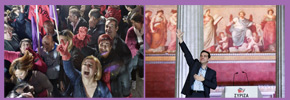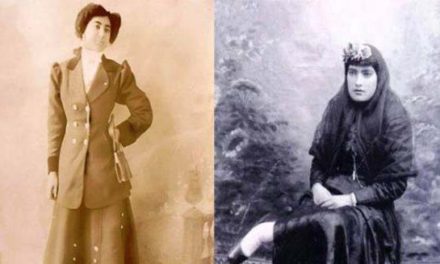مردم چیزی بیش از یک انتخابات می خواهند، آنها آزادی می خواهند
شنبه ۲۰ جون ۲۰۰۹
به من مسئولیت داده شده است که به دنیا بگویم در ایران چه اتفاقی دارد می افتد. ستاد آقای میرحسین موسوی، کسی که مردم ایران می خواهند او رئیس جمهورشان باشد، از من خواسته اند که این کار را انجام دهم. آنها از من خواسته اند که بگویم که چطور ستادهای آقای موسوی توسط افراد لباس شخصی مورد تهاجم و تخریب قرار گرفت. از من خواسته اند که بگویم چطور فرماندهان نظامی به او دستور داده اند که باید ساکت بماند. از من خواسته اند که به مردم بگویم در خیابان ها باشند، چرا که سیستم اطلاع رسانی مختل شده است.
مردم خواهان رای گیری دوباره هستند. چرا که فراتر از یک تقلب اتفاق افتاده است. این نقطه حساس در تاریخ ماست. در ۳۰ سال گذشته از انقلاب سال ۱۹۷۹ ما ۸۰ درصد دیکتاتوری و فقط ۲۰ درصد دمکراسی داشته ایم. ما دیکتاتوری داریم، چرا که یک نفر مسئولیت ایران را بر عهده دارد و آن یک نفر رهبر است. که اول خمینی و در حال حاضر خامنه ای است. او ارتش، روحانیت، سیستم قضایی، رسانه ها و همچنین پول نفت را تحت کنترل دارد.
و اما در مورد آن ۲۰ درصد دمکراسی: انتخاب خاتمی و اصلاح طلبان در یک دوره مجلس و این واقعیت که شخصی مثل موسوی می تواند در انتخابات حضور یابد.
اما از جمعه گذشته این ۲۰ درصد دمکراسی هم از بین رفته است. خامنه ای اعلام کرد که احمدی نژاد برنده انتخابات بوده و هرکسی که با این مسئله مخالفت کند مورد سرکوب قرار خواهد گرفت. مردم می خواستند که در چهارچوب قانون تظاهرات کنند، اما مقامات به آنها اجازه ندادند. این برای اولین بار است که ما پس از ۳۰ سال، میلیون ها نفر را بدون اجازه رهبر در خیابان ها می بینیم. مردم ایران در حال حاضر گرد هم می آیند تا برای کسانی که کشته شده اند عزاداری کنند. مردم ایران فرهنگی دارند که شهادت را خیلی متعالی می داند، مردم ایران امروز برای کسانی که روز سه شنبه مورد اصابت گلوله قرار گرفته اند دور هم جمع شده اند و اگر این کشتار ادامه یابد این گردهمایی ادامه خواهد داشت. و چرا مردم ایران نمی خواهند که احمدی نژاد رهبر آنها باشد؟ زیرا او چیزی جز بلندگوی خامنه ای نیست. اوضاع اقتصادی برخلاف ۲۸۰ میلیارد دلار درآمد نفتی، بدتر شده است. آزادی های فردی و اجتماعی بسیار محدودتر از دوران خاتمی است و دنیا به ما به عنوان یک ملت تروریست که به دنبال جنگ است نگاه می کند.
هنگامی که خاتمی رئیس جمهور ایران بود، بوش رئیس جمهور آمریکا بود. در حال حاضر آمریکایی ها اوباما را دارند و ما یک نسخه از بوش را. ما به یک اوباما احتیاج داریم که بتواند راه حل هایی را برای مشکل کشور پیدا کند. با وجود آن که قدرت همچنان در دست خامنه ای خواهد بود، اما رئیس جمهوری مثل موسوی می تواند استبداد را تخفیف دهد.
بعضی ها معتقدند که این اعتراضات کمرنگ خواهد شد، چرا که کسی آن را رهبری نمی کند. تمام نزدیکان موسوی دستگیر شده اند و ارتباط او با جهان خارج محدود شده است. مردم فقط از طریق حرف های دهان به دهان به خیابان ها می آیند، چرا که تلفن های موبایل و اینترنت آن ها بسته شده است. ادامه گردهمایی آن ها نشان می دهد که آن ها چیزی بیش از یک انتخابات می خواهند. آن ها آزادی می خواهند و اگر به آنها داده نشود ما با یک انقلاب دیگر مواجه خواهیم شد.
۳۰ سال پیش در دوران انقلاب قبلی، ما از همدیگر حمایت می کردیم. وقتی پلیس از گاز اشک آور استفاده می کرد، برای خنثی کردن اثر آن آتش روشن می کردیم. مردم ماشین های خود را به آتش می کشیدند تا دیگران را نجات دهند. از آن موقع دولت سعی کرده است، تا مردم را از هم جدا کند، مثل دریایی که قطره قطره شده باشد. آن چه ما از دست دادیم “با هم بودن” بود. در ماه گذشته ما همدیگر را از نو یافتیم.
تمام نیروهای مسلح در ایران تنها برای سرکوب یک شهر کافی هستند و نه کل یک کشور. بعضی می گویند که موسوی نمی تواند چیزی را عوض کند، چرا که او خود قسمتی از این سیستم است. این تا حدودی درست است چرا که آنها نمی گذارند کسی که متعلق به حلقه آنها نیست بتواند در یک مقام برتر قرار گیرد، اما تمامی اعضای یک خانواده مثل هم نیستند و در مورد موسوی هم باید دانست که او در این سال ها عوض شده است. قبل از انقلاب او یک روشنفکر مذهبی و یک هنرمند بود که انقلابی بود، اما از ملاها حمایت نمی کرد. چرا که او شاگرد دکتر شریعتی بود.
بعد از انقلاب هنگامی که تمام روشنفکران مذهبی و حتی روشنفکران چپ از خمینی حمایت می کردند او برای ۸ سال نخست وزیر بود. اقتصاد وضع ثابتی داشت و او نه دستور کشتن مخالفان را صادر کرد و نه فاسد شد. برای خنثی کردن قدرت او مقام نخست وزیری از قانون اساسی برداشته شد، و او از سیاست رانده شد و موسوی به دنیای هنرمندان بازگشت.
در کشوری که احزاب سیاسی واقعی وجود ندارند، هنرمندان می توانند مثل یک حزب عمل کنند. هنرمندان از خاتمی حمایت کردند و اینک هم از موسوی حمایت می کنند.
در حال حاضر موسوی یک اصلاح طلب است. او اینک گاندی را می شناسد، قبلا او فقط چه گوارا را می شناخت. اگر او قدرت را از طریق خشونت به دست آورد آن را باید با خشونت هم حفظ کند. به همین دلیل مردم ایران یک انقلاب سبز راه انداخته اند که با صلح و دمکراسی تعریف می شود.
شنبه ۲۰ ژوئن ۲۰۰۹
Mohsen Makhmalbaf
Interview with Gardien
۲۰, juin, 2009
I have been given the responsibility of telling the world what is happening in
Iran. The office of Mir Hossein Mousavi, who the Iranian people truly want as their leader, has asked me to do so. They asked me to tell how Mousavi’s headquarters was wrecked by plainclothes police officers. They asked me to tell how the commanders of the revolutionary guard ordered him to stay silent. They asked me to tell people to take to the streets because Mousavi could not tell them directly.
The people in the streets don’t want a recount of last week’s election, they want it annulled. This is a crucial moment in our history. Over the past 30 years, since the revolution of 1979, we have had 80% dictatorship, and only 20% democracy. We have dictatorship because one person is in charge of
Iran and that is the supreme leader – first Khomeini, now Khamenei. He controls the army and the clergy, the justice system and the media, as well as our oil money.
There are some examples of democracy – reformists elected to parliament, and the very fact that a person like Mousavi could stand for election. But, since Friday, this element of democracy has vanished. Khamenei announced that Ahmadinejad had won the election and that whoever opposes this will be suppressed. People wanted to have demonstrations within the law, but the authorities would not let them. This is the first time we have seen millions on the streets without the permission of the supreme leader.
Now they are gathering to mourn those who have died. The people of
Iran have a culture that elevates martyrdom. In the period running up to the revolution, when people were killed at demonstrations, others would gather again in the days following the death. This cycle carried on for six months, and cul
minated in the revolution. Today they are gathering in
Tehran for those who were shot on Tuesday, and if there are more killings, this will continue.
So why do the Iranian people not want Ahmadinejad as their leader? Because he is nothing but a loudspeaker for Khamenei. Economic problems have grown worse, despite $280bn of oil revenue. Social and literary freedom is much more restricted than under
Khatami. The world views us as a terrorist nation, on the look-out for war.
When
Khatami was president of
Iran, Bush was president of the
US. Now the Americans have Obama and we have our version of Bush. We need an Obama who can find solutions for our country’s problems. Although power would remain in the hands of Khamenei, a president like Mousavi could weaken the supreme leader.
Some suggest that the protests will fade because nobody is leading them. All those close to Mousavi have been arrested, and his contact with the outside world has been restricted. People are only able to tell each by other by word of mouth to go out on the streets, because their mobile phones and the internet have been closed down. That they continue to gather shows that they want something more than an election. They want freedom, and if they are not granted it we will be faced with another revolution.
Thirty years ago, at the time of the last revolution, we supported each other. When police used tear gas, fires would be lit to neutralize the effects. People would set their own cars on fire to save others. Since then, the government has tried to separate people from one other. What we lost was our togetherness, and in the past month we have found that again. All the armed forces in
Iran are only enough to repress one city and not the whole country. The people are like drops of water coming together in a sea.
People say that Mousavi won’t change anything as he is part of the establishment. That is correct to a degree because they wouldn’t let anyone who is not in their circle rise to seniority. But not all members of a family are alike, and for Mousavi it is useful to understand how he has changed over time.
Before the revolution he was a religious intellectual and an artist, who supported radical change but did not support the mullahs. After the revolution, when all religious intellectuals and even leftists backed Khomeini, he served as prime minister for eight years. The economy was stable, and he did not order the killings of opponents, or become corrupt.
In order to neuralise his power, the position of prime minister was eli
minated from the consitution and he was pushed out of politics. So Mousavi returned to the world of artists because in a country where there are no real political parties, artists can act as a party. The artists supported
Khatami and now, they support Mousavi.
Previously, he was revolutionary, because everyone inside the system was a revolutionary. But now he’s a reformer. Now he knows Ghandi – before he knew only Che Guevara. If we gain power through aggression we should keep it through aggression – that is why we’re having a green revolution that is defined by peace and democracy.




